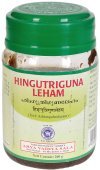Rasona: 6 definitions
Introduction:
Rasona means something in Hinduism, Sanskrit. If you want to know the exact meaning, history, etymology or English translation of this term then check out the descriptions on this page. Add your comment or reference to a book if you want to contribute to this summary article.
In Hinduism
Ayurveda (science of life)
Cikitsa (natural therapy and treatment for medical conditions)
Source: Wisdom Library: Ayurveda: CikitsaRasona (रसोन):—Another name for Laśuna, a medicinal plant (Allium sativum) used in the treatment of fever (jvara), as described in the Jvaracikitsā (or “the treatment of fever”) which is part of the 7th-century Mādhavacikitsā, a Sanskrit classical work on Āyurveda.
Dietetics and Culinary Art (such as household cooking)
Source: Shodhganga: Dietetics and culinary art in ancient and medieval IndiaRasona (रसोन) refers to “garlic” and is mentioned in a list of potential causes for indigestion in the 17th century Bhojanakutūhala (dravyaguṇāguṇa-kathana), and is commonly found in literature dealing with the topics of dietetics and culinary art, also known as Pākaśāstra or Pākakalā.—A complete section in Bhojanakutūhala is devoted for the description of agents that cause indigestion [viz., rasona (garlic)]. These agents consumed on a large scale can cause indigestion for certain people. The remedies [viz., payas (milk)] for these types of indigestions are also explained therewith.
Kalpa (Formulas, Drug prescriptions and other Medicinal preparations)
Source: Shodhganga: Edition translation and critical study of yogasarasamgrahaRasona (रसोन) is another name for “Laśuna” and is dealt with in the 15th-century Yogasārasaṅgraha (Yogasara-saṅgraha) by Vāsudeva: an unpublished Keralite work representing an Ayurvedic compendium of medicinal recipes. The Yogasārasaṃgraha [mentioning rasona] deals with entire recipes in the route of administration, and thus deals with the knowledge of pharmacy (bhaiṣajya-kalpanā) which is a branch of pharmacology (dravyaguṇa).
Veterinary Medicine (The study and treatment of Animals)
Source: Asian Agri-History: Paśu Āyurvēda (Veterinary Medicine) in GaruḍapurāṇaRasona (रसोन) refers to Allium sativum, and is used in the Viśodhana (“washing off the wound’s impurities”) of wounds (vraṇa), according to Āyurveda sections in the Garuḍapurāṇa.—[...] After Viśodhana (wash off the ulcer's/wound's impurities by medicated decoction), the following formulations can be used for śodhana (purification) and ropaṇa (healing) externally:—[... e.g.,] The eraṇḍa-mūla (Castor root), two types of haridrā (Turmeric), Citraka (Plumbago zeylanica), Viśvabheṣaja (Zingiber officinale), Rasona (Allium sativum) and saindhava (rock salt) are ground well with takra (butter milk) or kāñjī (sour gruel). [...]

Āyurveda (आयुर्वेद, ayurveda) is a branch of Indian science dealing with medicine, herbalism, taxology, anatomy, surgery, alchemy and related topics. Traditional practice of Āyurveda in ancient India dates back to at least the first millenium BC. Literature is commonly written in Sanskrit using various poetic metres.
General definition (in Hinduism)
Source: Yoga Magazine: 2005Ayurveda calls garlic 'the wonder food'. It is a very pungent root whose botanical name is Allium Sativum, and it is from the Aliaceae family. In Sanskrit it is called rasona, in Hindi lasan, and in Marathi lasoon. It gives strength to the body, and is especially good for the heart. It is included in almost all forms of Indian curries, although it is not eaten by very puritanical sects like Vaishnavites because it is reputed to be an aphrodisiac. It is also eaten raw with oil and chillies as chutney, or with salt as a blood cleanser and for nervous disorders such as headaches and hysteria.
Languages of India and abroad
Sanskrit dictionary
Source: DDSA: The practical Sanskrit-English dictionaryRasona (रसोन).—A kind of garlic; cf. लसोन (lasona).
Derivable forms: rasonaḥ (रसोनः).
See also (synonyms): rasuna.
Sanskrit, also spelled संस्कृतम् (saṃskṛtam), is an ancient language of India commonly seen as the grandmother of the Indo-European language family (even English!). Closely allied with Prakrit and Pali, Sanskrit is more exhaustive in both grammar and terms and has the most extensive collection of literature in the world, greatly surpassing its sister-languages Greek and Latin.
See also (Relevant definitions)
Starts with: Rasna, Rasonah, Rasonaka, Rasonam.
Full-text (+7): Rasna, Rasuna, Rasonam, Allium sativum, Kalka, Lashuna, Shodhana, Ropana, Eranda, Citraka, Sour gruel, Takra, Zingiber officinale, Saindhava, Haridra, Castor root, Rock salt, Vishvabheshaja, Turmeric, Castor.
Relevant text
Search found 8 books and stories containing Rasona; (plurals include: Rasonas). You can also click to the full overview containing English textual excerpts. Below are direct links for the most relevant articles:
Rasa Jala Nidhi, vol 3: Metals, Gems and other substances (by Bhudeb Mookerjee)
Part 5 - Taking of tin < [Chapter VI - Metals (6): Vanga (tin)]
Part 14 - Dietary presecriptions and prohibitions when taking iron < [Chapter IV - Metals (4): Lauha (iron)]
Part 24 - Usage of poisons < [Chapter XXX - Visha (poisons)]
Rasa Jala Nidhi, vol 2: Minerals (uparasa) (by Bhudeb Mookerjee)
Part 6 - Removal of odour from sulphur < [Chapter VIII - Uparasa (9): Gandhaka (sulphur)]
Part 3 - Incineration of haritala < [Chapter XII - Uparasa (13): Haritala (orpiment)]
The Garuda Purana (by Manmatha Nath Dutt)
Chapter CCXXVI - Medical treatment of the diseases of horses < [Dhanvantari Samhita]
Amarakoshodghatana of Kshirasvamin (study) (by A. Yamuna Devi)
Sushruta Samhita, Volume 6: Uttara-tantra (by Kaviraj Kunja Lal Bhishagratna)
Chapter XLII - Symptoms and Treatment of Abdominal Tumors (Gulma) < [Canto III - Kaya-chikitsa-tantra (internal medicine)]
Chapter XLI - Symptoms and Treatment of Phthisis (Shosha) < [Canto III - Kaya-chikitsa-tantra (internal medicine)]
Rasa Jala Nidhi, vol 1: Initiation, Mercury and Laboratory (by Bhudeb Mookerjee)
Part 12 - Mercurial operations (10): Swallowing of metals of Mercury (grasana) < [Chapter IV-V - Mercurial operations]
Part 18 - Mercurial operations (16): Incineration of mercury (bhasmikarana) < [Chapter IV-V - Mercurial operations]
Related products




